A Quote by Edgar Allan Poe
Either the memory of past bliss is the anguish of to-day; or the agonies which are have their origins in ecstasies which might have been.
Related Quotes
There are confessable agonies, sufferings of which one can positively be proud. Of bereavement, of parting, of the sense of sin and the fear of death the poets have eloquently spoken. They command the world's sympathy. But there are also discreditable anguishes, no less excruciating than the others, but of which the sufferer dare not, cannot speak. The anguish of thwarted desire, for example.
He alone is worthy of the appellation who either does great things, or teaches how they may be done, or describes them with a suitable majesty when they have been done; but those only are great things which tend to render life more happy, which increase the innocent enjoyments and comforts of existence, or which pave the way to a state of future bliss more permanent and more pure.
Every man among us is more fit to meet the duties and responsibilities of citizenship because of the perils over which, in the past, the nation has triumphed; because of the blood and sweat and tears, the labor and the anguish, through which, in the days that have gone, our forefathers moved on to triumph.
That this liberty [of the press] is often carried to excess; that it has sometimes degenerated into licentiousness, is seen and lamented, but the remedy has not yet been discovered. Perhaps it is an evil inseparable from the good with which it is allied; perhaps it is a shoot which cannot be stripped from the stalk without wounding vitally the plant from which it is torn. However desirable those measures might be which might correct without enslaving the press, they have never yet been devised in America.
In memory, you can access something from the past, anything that you've experienced that you remember - it's there. Now, you might have a memento of it in a photograph or in a film or a building or some clothes that you wore. There might be something that connects you to this memory. But all of us are just all caught in this time, whatever that is.






































